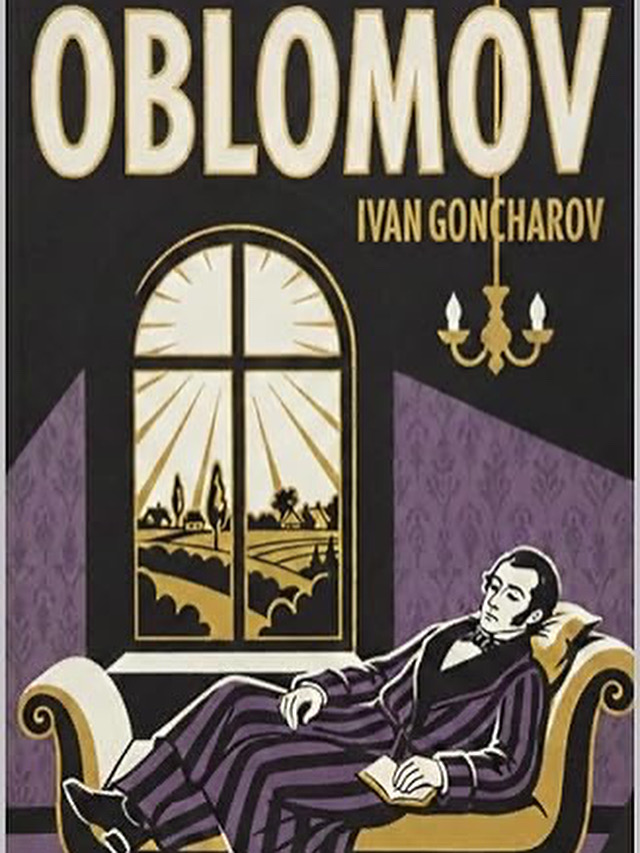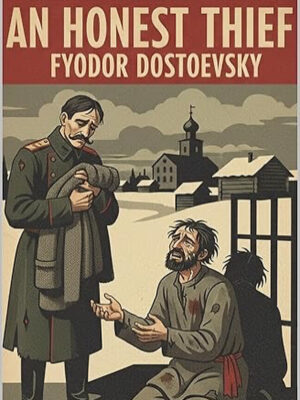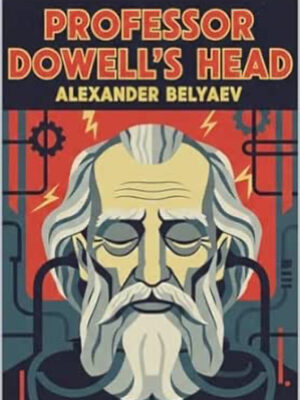I
On Gorokhovaya Street, in one of the large buildings, whose population would suffice for an entire provincial town, Ilya Ilyich Oblomov lay in bed in his apartment that morning.
He was a man of about thirty-two or three years old, of medium height, with a pleasant appearance, dark gray eyes, but utterly lacking any definite idea or focus in his facial features. Thought wandered freely like a bird across his face, fluttered in his eyes, settled on his half-open lips, hid in the folds of his forehead, then vanished completely, and then a steady light of carefree idleness glowed over his entire face. From his face, this carefree air spread to the poses of his entire body, even to the folds of his dressing gown.
Sometimes his gaze clouded over with an expression of what seemed like fatigue or boredom; but neither fatigue nor boredom could for a moment drive away the softness from his face, which was the dominant and fundamental expression, not only of his face but of his entire soul; and his soul shone so openly and clearly in his eyes, in his smile, in every movement of his head and hand. And a superficially observant, cold person, glancing casually at Oblomov, would say, “He must be a kind soul, so simple!” A deeper and more sympathetic person, gazing long at his face, would walk away in pleasant contemplation, with a smile.
Ilya Ilyich’s complexion was neither rosy, nor dark, nor distinctly pale, but indifferent, or it seemed so, perhaps because Oblomov had somehow become flabby prematurely: whether from lack of movement or fresh air, or perhaps both. In general, his body, judging by the matte, overly white skin of his neck, his small plump hands, and soft shoulders, seemed too pampered for a man.
His movements, even when he was agitated, were constrained by a softness and a kind of graceful laziness. If a cloud of worry descended from his soul upon his face, his gaze would become hazy, wrinkles would appear on his forehead, and a play of doubt, sorrow, and fear would begin; but rarely did this anxiety solidify into a definite idea, and even more rarely did it turn into an intention. All anxiety would resolve itself in a sigh and die away in apathy or drowsiness.
How well Oblomov’s house attire suited the placid features of his face and his pampered body! He wore a dressing gown of Persian material, a true Oriental dressing gown, without the slightest hint of Europe, no tassels, no velvet, no waistline, and very roomy, so much so that Oblomov could wrap himself in it twice. The sleeves, in unchanging Asian fashion, widened from his fingers to his shoulder. Although this dressing gown had lost its original freshness and in places its primitive, natural sheen had been replaced by an acquired one, it still retained the brightness of its Oriental color and the strength of its fabric.
In Oblomov’s eyes, the dressing gown possessed a multitude of invaluable merits: it was soft, flexible; his body didn’t feel it; like an obedient slave, it yielded to the slightest movement of his body.
Oblomov always walked around the house without a tie and without a waistcoat because he loved space and freedom. His slippers were long, soft, and wide; when he dropped his feet from the bed to the floor without looking, he invariably landed in them at once.
Lying down was not a necessity for Ilya Ilyich, as it would be for an invalid or someone who wants to sleep, nor an accident, as for someone who is tired, nor a pleasure, as for a sluggard: it was his normal state. When he was at home — and he was almost always at home — he was always lying down, and always in the same room where we found him, which served him as bedroom, study, and reception room. He had three other rooms, but he rarely looked into them, perhaps in the morning, and not even every day, when someone cleaned his study, which wasn’t done daily. In those rooms, the furniture was covered with dust sheets, and the blinds were down.
The room where Ilya Ilyich lay seemed beautifully furnished at first glance. There was a mahogany desk, two sofas upholstered in silk, beautiful screens with birds and fruits embroidered on them, unlike anything found in nature. There were silk curtains, carpets, several paintings, bronze, porcelain, and a multitude of beautiful trinkets.
But the experienced eye of a person with refined taste, with one quick glance at everything there, would only discern a desire to somehow observe decorum (propriety/etiquette), the unavoidable decencies, just to get them over with. Oblomov, of course, only bothered with this when he furnished his study. A refined taste would not have been satisfied with these heavy, ungraceful mahogany chairs, or the shaky shelving units. The back of one sofa had sagged, and the glued veneer had come off in places.
The paintings, vases, and trinkets bore precisely the same character.
The master himself, however, viewed the furnishings of his study so coldly and distractedly, as if asking with his eyes: “Who dragged all this in here and arranged it?” From such a cold view of his own property by Oblomov, and perhaps from an even colder view of the same subject by his servant, Zakhar, the appearance of the study, upon closer inspection, was striking for the prevailing neglect and sloppiness.
On the walls, near the paintings, dust-laden cobwebs clung in festoons; mirrors, instead of reflecting objects, could more readily serve as tablets for scribbling notes in the dust. The carpets were stained. A forgotten towel lay on the sofa; rarely a morning passed without a plate with a salt shaker and a gnawed bone from yesterday’s dinner standing uncleared on the table, or without breadcrumbs scattered about.
If it weren’t for this plate, or the freshly smoked pipe leaning against the bed, or the master himself lying on it, one might have thought that no one lived here — everything was so dusty, faded, and generally devoid of living traces of human presence. On the shelving units, it’s true, lay two or three open books, a newspaper lay scattered, and an inkstand with pens stood on the desk; but the pages on which the books were open were covered with dust and had yellowed; it was clear they had been abandoned long ago; the newspaper was from last year, and from the inkstand, if one dipped a pen into it, only a startled fly would buzz out.
Ilya Ilyich woke up, contrary to his habit, very early, around eight o’clock. He was deeply worried about something. Fear, then melancholy and annoyance, alternately appeared on his face. It was clear that an internal struggle was overcoming him, and his mind had not yet come to his aid.
The fact was that Oblomov had received an unpleasant letter from his bailiff (village elder) the day before. It’s well known what kind of unpleasantries a bailiff might write about: crop failure, arrears, reduced income, etc. Although the bailiff had written similar letters to his master last year and the year before that, this latest letter had the same strong effect as any unpleasant surprise.
Was it easy? He had to think about means to take some measures. However, one must credit Ilya Ilyich’s concern for his affairs. Upon receiving the first unpleasant letter from the bailiff several years ago, he had already begun to devise a mental plan for various changes and improvements in the management of his estate.
This plan intended to introduce various new economic, police, and other measures. But the plan was far from fully thought out, and the unpleasant letters from the bailiff recurred annually, prompting him to action and, consequently, disturbing his peace. Oblomov recognized the necessity of undertaking something decisive before the completion of the plan.
As soon as he woke up, he immediately intended to get up, wash, and, after drinking tea, think things through carefully, consider some points, write them down, and generally attend to this matter properly.
For half an hour, he continued to lie there, tormented by this intention, but then he decided that he would still have time to do it after tea, and tea could be drunk, as usual, in bed, especially since nothing prevented him from thinking while lying down.
And so he did. After tea, he had already raised himself from his bed and was on the verge of getting up; looking at his slippers, he even began to lower one foot from the bed towards them, but immediately pulled it back.
It struck half past nine, and Ilya Ilyich stirred.
“What am I really doing?” he said aloud with annoyance. “I must have some conscience: it’s time to get to work! Just give myself free rein, and then…”
“Zakhar!” he shouted.
In the room, which was separated from Ilya Ilyich’s study only by a small corridor, there was at first a sound like the growling of a chained dog, then the thud of feet jumping down from somewhere. This was Zakhar jumping down from the sleeping bench where he usually spent his time, immersed in drowsiness.
An elderly man entered the room, wearing a gray frock coat with a tear under the armpit from which a scrap of shirt protruded, and a gray waistcoat with copper buttons, a bald head like a knee, and immensely wide and thick blond sideburns streaked with gray, each of which would have been enough for three beards.
Zakhar did not try to change not only the image given to him by God but also his attire, which he wore in the village. His clothes were tailored to a pattern he had brought from the village. He liked the gray frock coat and waistcoat because in this semi-uniform attire he saw a faint reminiscence of the livery he once wore when accompanying his late masters to church or to visit; and in his memories, the livery was the sole representative of the dignity of the Oblomov household.
Nothing else reminded the old man of the broad and comfortable gentry life in the depths of the village. The old masters had died, the family portraits remained at home and were probably lying somewhere in the attic; the traditions of the old way of life and the importance of the family were all dying out or lived only in the memory of a few old people who remained in the village. Therefore, the gray frock coat was precious to Zakhar: in it, and in a few other signs preserved in his master’s face and manners that reminded him of his parents, and in his whims, which he grumbled about, both to himself and aloud, but which he inwardly respected as a manifestation of the master’s will, of the landlord’s right, he saw faint hints of departed grandeur.
Without these whims, he somehow didn’t feel a master over him; without them, nothing resurrected his youth, the village they had left long ago, and the traditions of this old house, the only chronicle kept by old servants, nannies, wet nurses, and passed down from generation to generation.
The Oblomov house had once been rich and famous in its region, but then, God knows why, it grew poorer and smaller and finally imperceptibly got lost among the not-so-old noble houses. Only the gray-haired servants of the house preserved and passed on to each other a faithful memory of the past, cherishing it as a relic.
That’s why Zakhar loved his gray frock coat so much. Perhaps he also treasured his sideburns because he had seen many old servants with this ancient, aristocratic adornment in his childhood.
Ilya Ilyich, immersed in thought, did not notice Zakhar for a long time. Zakhar stood silently before him. Finally, he cleared his throat.
“What is it?” Ilya Ilyich asked.
“Didn’t you call?”
“Called? Why did I call — I don’t remember!” he replied, stretching. “Go back for now, and I’ll remember.”
Zakhar left, and Ilya Ilyich continued to lie and think about the cursed letter.
A quarter of an hour passed.
“Well, enough lying around!” he said. “I must get up… But wait, let me read the bailiff’s letter one more time carefully, and then I’ll get up.” — “Zakhar!”
Again the same jump and a stronger growl. Zakhar entered, and Oblomov again fell into thought. Zakhar stood for about two minutes, disapprovingly, looking at his master slightly askance, and finally walked towards the door.
“Where are you going?” Oblomov suddenly asked.
“You’re not saying anything, so why stand here doing nothing?” Zakhar croaked, lacking any other voice, which, according to him, he had lost while hunting with dogs when he was with the old master, and a strong wind supposedly blew into his throat.
He stood half-turned in the middle of the room and kept looking askance at Oblomov.
“Are your legs withered that you can’t stand? You see I’m preoccupied — so wait! Haven’t you been lying around enough there? Find the letter I received from the bailiff yesterday. Where did you put it?”
“What letter? I haven’t seen any letter,” Zakhar said.
“You took it from the postman: the dirty one!”
“Where was it put — how should I know?” Zakhar said, patting papers and various items lying on the table.
“You never know anything. Look in the basket over there! Or has it fallen behind the sofa? The back of the sofa still isn’t fixed; why don’t you call a carpenter and fix it? You broke it, after all. You don’t think of anything!”
“I didn’t break it,” Zakhar replied, “it broke by itself; it couldn’t last forever: it had to break sometime.”
Ilya Ilyich didn’t consider it necessary to argue the point.
“Did you find it?” he merely asked.
“Here are some letters.”
“Not those.”
“Well, then there are no more,” Zakhar said.
“Alright, go!” Ilya Ilyich said impatiently. “I’ll get up and find it myself.”
Zakhar went to his room, but just as he leaned his hands on the sleeping bench to jump onto it, a hasty cry was heard again: “Zakhar, Zakhar!”
“Oh, my God!” Zakhar grumbled, heading back to the study. “What torture is this? I wish death would come sooner!”
“What do you want?” he said, holding onto the study door with one hand and looking at Oblomov, as a sign of displeasure, so askance that he had to see his master with half an eye, and his master could only see one immense sideburn, from which you’d expect two or three birds to fly out.
“A handkerchief, quickly! You could have figured it out yourself: can’t you see!” Ilya Ilyich remarked sternly.
Zakhar showed no particular displeasure or surprise at this command and reproach from his master, probably finding both quite natural from his perspective.
“And who knows where the handkerchief is?” he grumbled, walking around the room and feeling each chair, though it was evident there was nothing on the chairs.
“You lose everything!” he remarked, opening the drawing-room door to see if it was there.
“Where? Look here! I haven’t been there since the day before yesterday. And hurry up!” Ilya Ilyich said.
“Where’s the handkerchief? No handkerchief!” Zakhar said, spreading his hands and looking into all corners. “Oh, there it is,” he suddenly croaked angrily, “under you! There’s an end sticking out. You’re lying on it yourself and asking for a handkerchief!”
And without waiting for an answer, Zakhar started to leave. Oblomov felt a little awkward about his own blunder. He quickly found another reason to blame Zakhar.
“What cleanliness you have everywhere: the dust, the dirt, my God! Look, look, look in the corners — you don’t do anything!”
“If I don’t do anything…” Zakhar began in an offended voice, “I try, I spare no effort! I wipe the dust and sweep almost every day…”
He pointed to the middle of the floor and to the table where Oblomov had dined.
“There, there,” he said, “everything is swept, tidied up, as if for a wedding… What else?”
“And what’s this?” Ilya Ilyich interrupted, pointing to the walls and ceiling. “And this? And this?” He also pointed to the towel left from yesterday and the forgotten plate with a slice of bread on the table.
“Well, I suppose I’ll clear this away,” Zakhar said condescendingly, taking the plate.
“Only this! And the dust on the walls, and the cobwebs?” Oblomov said, pointing to the walls.
“I clean that for Holy Week: that’s when I clean the icons and remove the cobwebs…”
“And sweep the books, the paintings?”
“Books and paintings before Christmas: then Anisya and I will go through all the cupboards. And when will you clean now? You’re always at home.”
“I sometimes go to the theater or visit friends: that would be…”
“What kind of cleaning at night!”
Oblomov looked at him reproachfully, shook his head, and sighed, while Zakhar looked indifferently out the window and also sighed. The master seemed to think: “Well, brother, you are even more Oblomov than I am,” and Zakhar almost certainly thought: “You lie! You’re just good at speaking clever and pathetic words, but you don’t care about dust or cobwebs.”
“Do you understand,” Ilya Ilyich said, “that dust breeds moths? I sometimes even see a bedbug on the wall!”
“I have fleas too!” Zakhar replied indifferently.
“Is that good? That’s disgusting!” Oblomov remarked.
Zakhar smiled broadly, so much so that the smile encompassed even his eyebrows and sideburns, which spread apart, and a red spot diffused across his entire face up to his forehead.






Reviews
There are no reviews yet.